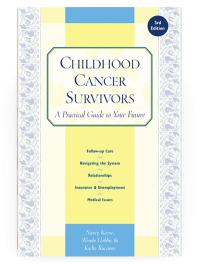Childhood Cancer Survivors
Body size and weight
Heights of survivors can be affected by radiation to the spine or alterations in hormone production (see Chapter 9 ). Changes in body weight also can occur in small numbers of survivors. Long-term weight loss can be caused by malabsorption and other gastrointestinal problems (see Chapter 15 ). At the other extreme, some studies show that a percentage of survivors become obese.
Not much is known about who is at risk for large weight gain or why it occurs. Survivors who tend to remain fairly inactive and become obese are usually those who had central nervous system radiation (for brain tumors and leukemia). Some of the questions for which the answers are not known are:
-
Are these survivors gaining weight because they are inactive?
-
Are they inactive because coordination is poor so they choose not to participate in physical activity?
-
Do they have more fatigue?
-
Is something altered physiologically in the brain that affects the drive to get up and move?
-
Is there a physiological change in the brain that postpones feelings of being full while eating?
-
Has their metabolism slowed?
-
Did they not get into a lifelong habit of exercise due to long periods of being sick and/or on treatment for cancer?
-
Does the use of steroids during treatment contribute to the risk of obesity?
Although much is not known, studies show that survivors who were treated with 2400 centigray (cGy) or more of cranial radiation have an increased likelihood of being obese. Females (especially those treated at early age) are at higher risk, although males can develop this late effect, too. The weight gain tends to begin in the first year off treatment.
Screening and detection
Monitoring growth includes plotting your height and weight on a chart at regular intervals. Measurements should be taken every 2 to 3 months during therapy and for the first year off therapy, and then once or twice a year until growth is complete. Abnormalities in weight or height require a consultation with an endocrinologist experienced in treating survivors of childhood cancer. For more information about growth, see Chapter 9 .
Medical management
If you are underweight or overweight, you need a consultation with a medical specialist (gastroenterologist or endocrinologist). A discussion with a dietitian can be very helpful in planning a healthy diet. Weight loss usually includes an increase in exercise and changes in diet. Family participation in physical activities also helps survivors maintain a normal body weight. Participating in organized weight loss programs, such as Weight Watchers ® , is sometimes helpful.
My daughter is a leukemia survivor who had cranial radiation. Treatment seems to have permanently altered her perception of taste. All that tastes good is sugar or salt.
After treatment, I purchased a big poster of the food pyramid. Every week when I am making my shopping list, I tell her to pick two vegetables and fruits for the week. I buy whatever she picks, and she has to eat them. I tell her that even if it doesn’t taste good, her body needs it.
Her weight is fine and she looks great. She hates to exercise, though. She refuses to hike, bike, or play sports. So I do the same with exercise as I do with food. I tell her she needs to do at least one organized physical activity each season. She’s taking ice skating this fall. I try to find teachers who are lots of fun so she will enjoy it.
Table of Contents
All Guides- 1. Survivorship
- 2. Emotions
- 3. Relationships
- 4. Navigating the System
- 5. Staying Healthy
- 6. Diseases
- 7. Fatigue
- 8. Brain and Nerves
- 9. Hormone-Producing Glands
- 10. Eyes and Ears
- 11. Head and Neck
- 12. Heart and Blood Vessels
- 13. Lungs
- 14. Kidneys, Bladder, and Genitals
- 15. Liver, Stomach, and Intestines
- 16. Immune System
- 17. Muscles and Bones
- 18. Skin, Breasts, and Hair
- 19. Second Cancers
- 20. Homage
- Appendix A. Survivor Sketches
- Appendix B. Resources
- Appendix C. References
- Appendix D. About the Authors
- Appendix E. Childhood Cancer Guides (TM)

